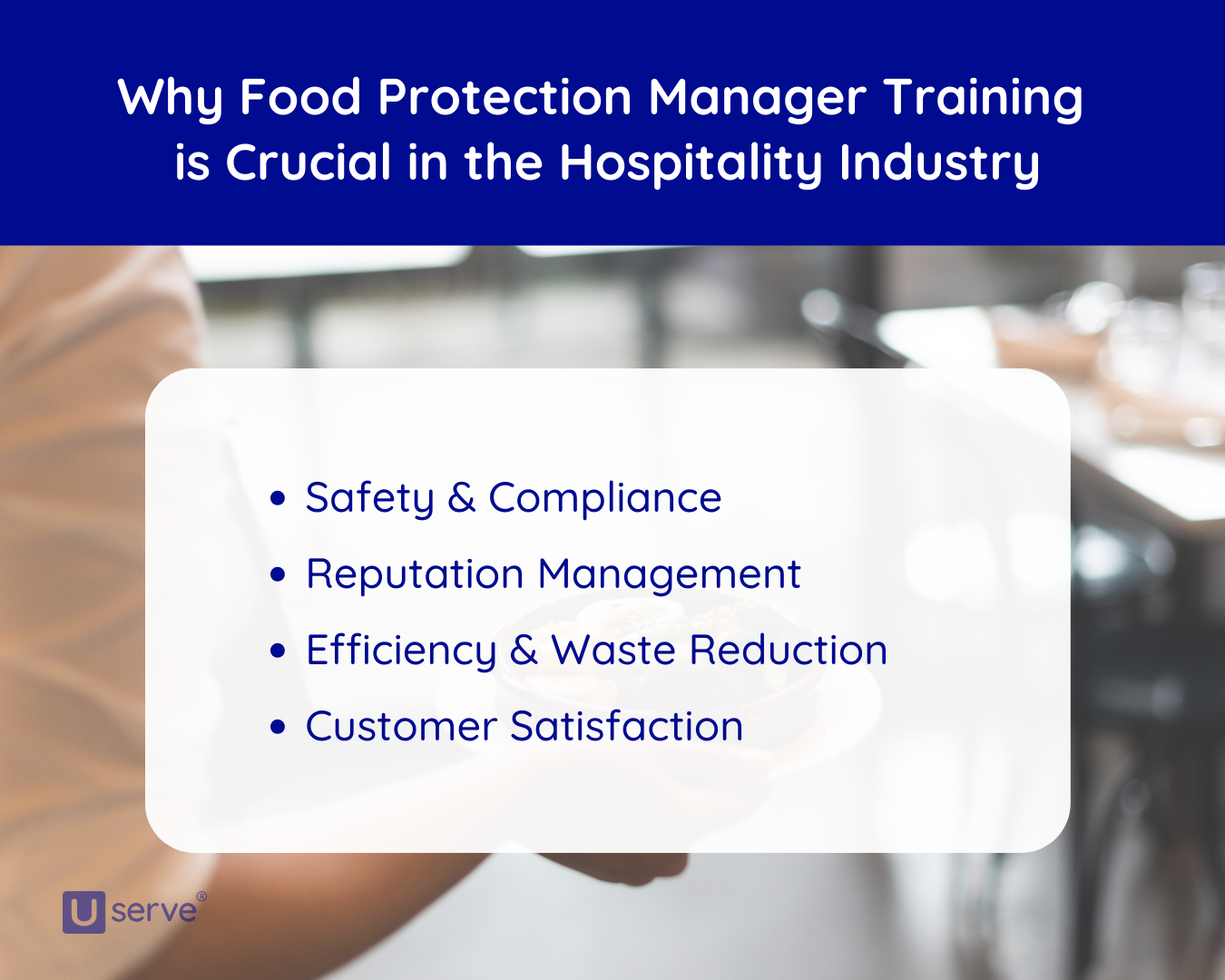From hotels and resorts to restaurants and cafés, the success of any hospitality business is dependent on the well-being and satisfaction of guests, with Food Protection Managers playing a critical role in maintaining food safety.
Food Protection Managers are responsible for overseeing the implementation of food safety procedures that ensure the food their team serves is safe for consumption. Their duties range from supervising the preparation and storage of food to managing staff and ensuring that all practices comply with both state and federal food safety regulations.
In order to do this effectively, they must be equipped with the appropriate knowledge and skills—this is where Food Protection Manager Training comes in.
Here’s an in-depth look at the significance of this training and the critical role it plays within the hospitality industry.
Food Protection Manager Training for Hospitality
Food Protection Manager Training addresses the needs of the hospitality industry by covering a broad range of topics designed to ensure that managers understand and can effectively implement the principles of food safety throughout their business.
Due to the diverse nature of the hospitality workforce, Userve has designed a comprehensive and accessible Food Protection Manager Program. This online course accommodates employees who speak English as a second language and ensures that all team members understand and can effectively apply food safety procedures.
The course explores the following topics:
- Key Responsibilities of a Food Protection Manager in Hospitality
- Biological Contamination
- Perishable and High-Risk Foods
- Physical, Chemical and Cross-Contamination
- Foodborne Illnesses
- Food Allergies
- Personal Hygiene
- Cleaning and Sanitizing
- Food Safety Regulations
- Developing a Food Safety Plan
- Emergency Preparedness and Response
- Pest Control
- Facility Design and Equipment Maintenance
- Employee Training and Management
- Food Safety Audits and Inspections
- Supplier Selection and Receiving Deliveries
- Food Storage and Preservation
- Menu Planning and Food Preparation
Key Responsibilities of a Food Protection Manager in Hospitality
The course begins by outlining the importance of clear communication when clarifying duties, especially in areas related to managing food safety and ensuring compliance with health standards. The goal is to help Food Protection Managers effectively establish food safety protocols and maintain a safe dining environment.
Biological Contamination
Next up is an overview of the biological contaminants responsible for foodborne illnesses, focusing on bacteria, viruses and other microorganisms.
Participants are informed about their responsibilities and provided with strategies for preventing contamination, with an emphasis on understanding and managing the risks associated with the four bacterial pathogens among the "Big 6" outlined by the United States Food and Drug Administration (FDA).
Perishable and High-Risk Foods
This section provides guidance regarding the effective management of perishable and high-risk foods, with a particular focus on the identification and handling of Time/Temperature Control for Safety (TCS) foods to prevent spoilage and resulting foodborne illnesses.
The key differences between high-risk and low-risk foods are explained, along with the associated food safety implications and prevention measures for both categories.
Physical, Chemical and Cross-Contamination
The course continues to explore the topic of contamination by examining other types, including physical, chemical and cross-contamination.
This part of the course starts by discussing the identification and prevention of physical contaminants in food, such as metal shards, glass and other foreign objects. It then moves on to explore the sources of chemical contamination and outlines measures for prevention, including proper storage and use of chemicals.
Strategies for the prevention of cross-contamination are shared too, with an emphasis on cross-contamination between raw and cooked ingredients.
Foodborne Illnesses
This section focuses on the importance of preventing foodborne illness, managing outbreaks and ensuring regulatory compliance. It covers key topics such as understanding the impact of foodborne illnesses on public health and the food service industry.
As well as outlining the steps necessary for managing and responding to foodborne illness outbreaks, this section explores the role Food Protection Managers play in establishing food safety policies aimed at minimizing the risk of these incidents.
Food Allergies
This part of the course explores the legal and moral responsibilities of a Food Protection Manager when it comes to allergen management.
Key topics include the identification of common food allergens and understanding allergic reactions to ensure customer safety. A summary of effective cross-contact prevention strategies is also provided.
Personal Hygiene
During this section, students learn about the significance of personal hygiene practices in preventing food contamination, specifically through handwashing, appropriate glove use and reporting illnesses.
It emphasizes the role that Food Protection Managers have to play in establishing effective personal hygiene policies, enforcing hygiene standards and conducting staff training.
Cleaning and Sanitizing
This section explains the difference between cleaning and sanitizing and the respective roles they play in maintaining food safety.
It explores appropriate cleaning techniques and cleaning agents, as well as detailing how establishments can implement effective cleaning and sanitizing schedules and procedures.
Food Safety Regulations
The course also ensures that participants are familiar with the laws and regulations governing food safety by providing an overview of federal, state and local food safety regulations and how they apply to foodservice operations.
It also describes the role that a Food Protection Manager plays in ensuring compliance with these regulations along with details regarding the consequences of non-compliance.
Developing a Food Safety Plan
In this section, students are given the steps for developing a food safety plan based on the principles outlined within the Hazard Analysis and Critical Control Points (HACCP) system.
HACCP principles:
- Conduct a Hazard Analysis
- Identify Critical Control Points
- Establish Critical Limits
- Monitor Critical Control Points
- Establish Corrective Actions
- Establish Record Keeping
- Establish Verification Procedures
Emergency Preparedness and Response
This section addresses the importance of being prepared for emergencies that can impact food safety, such as power outages, natural disasters and water emergencies.
It explores strategies for developing an emergency preparedness plan along with recommended recovery procedures designed to keep food businesses running safely in unforeseen circumstances.
Pest Control
The purpose of this section is to ensure that Food Protection Managers are able to identify common pests and put pest management strategies in place in order to prevent infestation and contamination.
It outlines the benefits of Integrated Pest Management (IPM) and the use of professional pest control services for prevention.
Facility Design and Equipment Maintenance
This part of the course discusses design principles for foodservice facilities that promote food safety and efficient workflows.
It also highlights the need for careful selection, installation and maintenance of equipment to ensure that the relevant food safety standards and regulations are met.
Employee Training and Management
This section describes the steps that a Food Protection Manager must take to develop an effective food safety training program for all staff members.
In addition, it outlines techniques for managing and motivating employees to consistently follow food safety practices, as well as methods for assessing and addressing food safety performance issues among staff.
Food Safety Audits and Inspections
The course teaches participants how to prepare for health department inspections, respond to findings and implement necessary corrections or improvements.
There is also information provided regarding the implementation of internal food safety audits designed to identify and address compliance issues.
Supplier Selection and Receiving Deliveries
The criteria for selecting suppliers and best practices for receiving food deliveries to ensure its safety are discussed in detail in this section of the course.
It covers techniques for evaluating supplier safety standards as well as procedures for receiving food, including inspection and temperature control.
Food Storage and Preservation
This section focuses on proper food storage and preservation techniques to prevent spoilage and contamination. It covers temperature control and monitoring as well as the implementation of inventory management procedures including FIFO (First In, First Out).
Additionally, several strategies for preventing cross-contamination in storage areas are provided.
Menu Planning and Food Preparation
The final lesson of the course explains how to design menus with food safety in mind, including considerations for allergens. It also discusses food preparation methods such as thawing, marinating, cooking and cooling, as well as ways to minimize the risk of contamination through safe serving practices.
4 Reasons Why Food Protection Manager Training is Crucial for the Hospitality Industry
1. Safety and Compliance
Food Protection Managers who have completed the relevant training and certification process are equipped to ensure that all food served meets strict safety standards, which is essential for guest safety and regulatory compliance.
Failing to comply with food safety regulations can have severe consequences in the hospitality sector, including fines, forced closures or even legal action. Additionally, incidents of foodborne illness linked to a hospitality business can result in significant reputational damage and economic loss due to potential lawsuits and a decrease in customers.
2. Reputation Management
A well-trained Food Protection Manager can significantly boost the reputation of a hospitality business by increasing consumer confidence.
3. Efficiency and Waste Reduction
Effective food safety management also helps in reducing waste, a significant concern in the hospitality industry, by ensuring proper storage, handling and preparation techniques.
4. Customer Satisfaction
Ensuring food safety is directly linked to customer satisfaction and repeat business, both of which are key drivers of success in the hospitality industry.
The Next Step for Hospitality Professionals
If you’re a hospitality professional looking to elevate your career or a business owner aiming to enhance your establishment's safety standards, Userve’s Food Protection Manager Program should be your next step.
By investing in Food Protection Manager Certification, you ensure your place at the forefront of food safety in the hospitality industry, ready to meet the needs of your guests with the highest standards of service and care.
Begin your certification journey by enrolling in the Food Protection Manager Program. Want to learn more before registering? Get in touch with the Userve team today to learn more about our food safety training courses.

